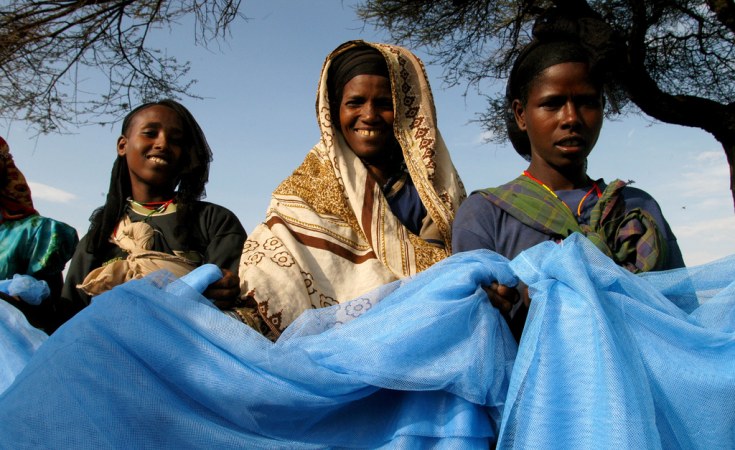The pay-off from investment in anti-malaria programmes has been nothing short of spectacular, and every effort must be made to maintain these efforts, says the director of the Malaria Control Program at the global health organisation, Path.
In the Africa region, according to the World Health Organization, malaria deaths have been cut by 33 percent in the past decade. Scaling up anti-malaria efforts has saved 800,000 to a million African lives, most of them in the last six years.
In a telephone interview with AllAfrica, Carlos (Kent) Campbell - who was at Path’s Seattle, Washington headquarters to speak at a World Malaria Day gathering - said that funds spent combating malaria have been “the best investment for health on a dollar-for-dollar basis of anything we have seen in the global community in decades”.
For relatively small costs, he said, huge gains have been and can continue to be made to prevent and eventually eradicate malaria. “Investment in malaria saves lives. And it saves lives at a level that exceeds virtually any other investment in global health that we have today, including vaccines,” he said.
Despite those dramatic achievements, the disease still kills some 800,000 people annually, over 90 percent of them in Africa. And malaria experts caution that a resurgence of malaria is possible, if programmes to combat the disease are not maintained.
“Malaria programmes require continual investment and continual application and continual levels of coverage, in particular of bed nets, to maintain the gains that have been achieved,” Campbell said.
He welcomed a call by the United Nations secretary general’s special envoy for malaria, Ray Chambers, challenging the global community to raise U.S.$3.2 billion to control and then eradicate the disease.
The United Nations goal is to achieve “near-zero” deaths from malaria by 2015.
The resources to maintain and extend the gains will need to come through “innovative funding”, said Campbell. These include multilateral and bilateral grants from governments and international institutions, as well as donations from private foundations.
One of the key international organizations is the Geneva-based Global Fund to Fight Aids, Tuberculosis and Malaria, which received some negative publicity over the past two years over management practices. Fund defenders said the oversight problems were very small compared to the number and scale of the grants it has made to fight diseases and the magnitude of its accomplishments.
“There is no question that the Global Fund has had problems over the past year, but under new leadership and a revised grant-making mechanism, we can be optimistic that the Global Fund is going to again become the aggressive, credible and successful mobiliser of funds,” said Campbell.
And while the international community should fund efforts to maintain the gains made against malaria, African governments - especially those that are resource-rich or preside over growing economies - should also invest significantly in the health of their citizens, said Campbell. He added that the lower levels of malaria deaths and the lives saved in the past decade are irrefutable evidence of what can be accomplished with consistent commitment and relatively modest resources.
“Malaria is a great story to persuade countries to invest in their citizens and invest in infrastructure, to invest in health,” he said. But he emphasized that the steps necessary to progress from a reduction in malaria deaths to elimination of the disease altogether will require “sustained controls”.
While increased use of insecticide-treated bed nets by those at risk of malaria has produced a “predictably precipitous fall in malaria cases and in malaria deaths”, said Campbell, it is necessary to maintain that achievement and to build on it.
Eliminating transmission requires a country to maintain distribution of insecticide-treated bed nets, replenishing them every few years. And other methods of driving transmission levels lower and lower must be intensified, said Campbell. Among them is the creation of improved surveillance mechanisms for diagnosis, followed by proactive use of medicines.
“This means actually treating individuals who have the malaria parasite – whether they are ill from the parasites or not,” said Campbell, explaining that mosquitoes pick up those parasites from humans and this creates the chain of transmission – from human to mosquito, back to humans.
Despite pressures on budgets in the current economic climate, Campbell is optimistic about the prospect for continued and intensified investment in the campaign against malaria.
“I think the primary reason for being optimistic is that the malaria story – what has been accomplished in a very short period of time with a very modest global investment - is truly remarkable,” he said.
Two big challenges remain. Firstly, to intensify efforts towards elimination, and secondly, to ensure that those countries that are not already on this pathway be enabled to adopt the raft of measures that are known to be effective at saving lives.
“We have the technology. It is a matter of funding, together with government and community organisation to apply these methodologies to achieve the success,” said Campbell.


